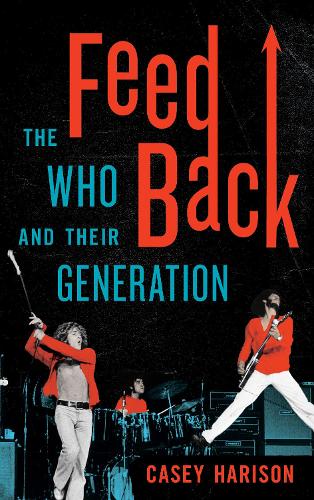
Feedback: The Who and Their Generation
(Hardback)
Publishing Details
Feedback: The Who and Their Generation
By (Author) Casey Harison
Bloomsbury Publishing PLC
Rowman & Littlefield Publishers
6th November 2014
United States
Classifications
General
Non Fiction
Musicians, singers, bands and groups
Composers and songwriters
782.421660922
Physical Properties
Hardback
230
Width 161mm, Height 235mm, Spine 21mm
467g
Description
In Feedback: The Who and Their Generation, historian Casey Harison offers a cultural and social history of one of the most successful bands of the 1960s British Invasion. In this historically sensitive account of the superbands impact during its first decade, Harison describes the key role played by The Who in the formation of the Atlantic Generation of rock n roll fans. When the band first burst onto the scene, they quickly established their reputation for amping up the volume, pushing distortion effects (feedback), and destroying instruments on stage at the end of performances. If The Who did nothing else for their generation, they would have easily secured a place in rock n roll history for high volume, smashed guitars, and kicked over drum sets. Ever since, The Whos stage antics have achieved iconic status in rock n roll. But we should not forget how startling this on-stage violence was and what it signified. Audiences had never experienced music so loud, a band so energetic, and stage destruction so redolent of the frustrations they shared. If anything, whod have thought the three in combinationwith excellent songwriting and studio productionwould emerge as a formula for success Feedback: The Who and Their Generation begins with the roots of rock music, setting the stage for The Who when its four band members came together in 1964 to produce their most successful work over the next decade. Throughout, Harison looks at the musical and social cross-Atlantic feedback that characterized The Whos reception and impact. From distorted guitars to big sound drum solos, The Who mirrored youth cultureits anger and its frustrations, from the class conflicts of England and Europe to the Vietnam protest movements of the United States. The Who, like no other British Invasion band, assumed a signal role in the transatlantic cultural traffic. From the American music traditions they borrowedrock, blues, R&Bthey transformed and returned to America the very music that served as their source of anger, echoing audiences angst while developing enormous fan bases in Europe and America.
Reviews
This worthy tome is [not] by any stretch of the imagination a bog standard blog or star struck hagiography, Feedback is rather an unapologetically full-on academic study of The Who, not merely as a humble rock band but also within the wider scheme of things. * Shindig! Magazine *
Academic look at The Who is, without question, one of the finest pieces of critical/analytical thought that anyone has ever presented on the band - and is long overdue. The fact is, The Who have always been more than a band. Like The Beatles were in so many ways, The Who are a cultural institution; their inventiveness through the "classic" years (when Keith Moon was still alive) led music - and maybe to a lesser degree some members of society - into a previously untapped realm of creativity....Whether you want to view this as a fan looking for a different sense of depth or a musicologist seeking new perspectives on this most important of bands, Feedback: The Who and Their Generation is a direct hit. If you're a student of The Who like I am, this is one of the few books that you must have in your library. * Popdose *
To his credit, Harison devotes a good portion of the books 175 (or so) pages to a survey and analysis of what he calls the 'crosscurrents of influence' between the USA and Europe. Theres plenty of interest within that topic, for both the scholarly-inclined and the general rock-fan reader. . . .and Harison does not disappoint. He really does know his stuff . . . Who fans reading this will learn some fascinating things about the history of the Western world, and that Feedback: The Who and Their Generation will spark new interest in The Who among . . . academic types. And whats not to like about those outcomes * Musoscribe *
Author Bio
Casey Harison is professor of history and director of the Center for Communal Studies at the University of Southern Indiana in Evansville, Indiana. Most of his writing and research has been in modern French and Atlantic history. He teaches modern World, European and Atlantic history and has published articles in Volume! The French Journal of Popular Music Studies, Atlantic Studies, History & Memory, and European History Quarterly.
